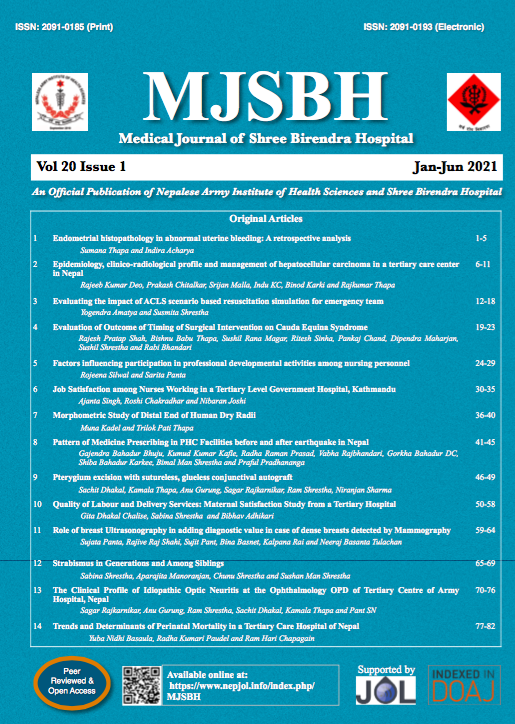Job Satisfaction among Nurses Working in a Tertiary Level Government Hospital
Keywords:
Advancement opportunity; Family support; Job satisfaction; Nursing practice; Recognition and rewardAbstract
Introduction: Job satisfaction refers to the employees having a feeling of job stability, career growth and a comfortable work life balance which implies that the employee is having satisfaction at job and the individual’s expectations are met. Job satisfaction is one of the most important factors that determine efficiency and productivity of human resources. It is vital to increase nurse’s job satisfaction to improve patients care quality and ensure adequate nursing workforce which helps in the development of effective strategies to address the nursing shortage and increase the quality of patient care. The objective of this study was to assess the level of job satisfaction among nurses working in the government hospital.
Methods: A descriptive cross-sectional design was adopted. All the nursing staffs working in Kanti Children’s Hospital, Kathmandu, Nepal were the study population and the total sample size was 81, selected using stratified random sampling techniques from different wards. The information was collected by using self-administered structured questionnaire. Level of job satisfaction was assessed by using 5point Likert Scale. The collected data were entered into SPSS version 16 and were analysed using descriptive and inferential statistics.
Results: The study findings showed that almost half (46.9%) of the respondents were satisfied with their current job. The satisfaction mean score obtained by work itself and nursing practice was (23.35 + 4.25) followed by advancement opportunity with mean value (20.44 + 4.97). Similarly, the satisfaction score obtained for recognition and reward (6.80 + 2.62) followed by participation in decision making with mean value (9.45 + 2.24). There was a statistical association between the level of job satisfaction and ethnicity (p = 0.41), marital status (p = 0.005), professional qualification (p = 0.001) and work experience (p = 0.002) of the respondents.
Conclusions: Based on the findings it is concluded that nearly half of the nurses were satisfied with their job. The most satisfying factor is the work itself whereas the least satisfying factor is the recognition and reward given to them followed by participation in decision making.
Downloads
Downloads
Published
How to Cite
Issue
Section
License
This license enables reusers to distribute, remix, adapt, and build upon the material in any medium or format for noncommercial purposes only, and only so long as attribution is given to the creator.




